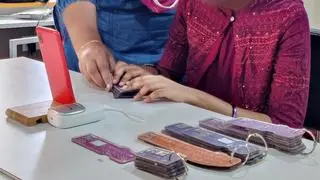Chetna Gala Sinha, Founder and Director, Mann Deshi Foundation and Mann Deshi Bank, vividly remembers her student days. She was inspired by Jaiprakash Narayan and participated in the people’s movement. She says she used to visit the villages of Satara district in Maharashtra, on week-ends, to work on women’s empowerment. It was during this time that she met her future husband, Vijay Sinha, a farmer. Chetna says she believed that the Shetkari Sanghatana represented only the wealthy farmers, till a meeting with its founder Sharad Joshi changed her outlook. She had studied Economics in Mumbai and realised that there was a vast difference between what was taught in colleges and what the situation was actually on the ground.
It was then, and at her husband’s prodding, that she decided to quit her job in Mumbai and move to Mhaswad to work with rural women for their empowerment. She formed Mann Deshi Foundation, named after the river flowing through Mhaswad. Chetna’s initial idea with the foundation was to help rural women in livelihood issues. This laid the grounds for the Mann Deshi Bank, a women’s cooperative bank.
The trigger point
According to Chetna, a lot of women would come to the weekly market in Mhaswad to sell their meagre produce from their small farms and would say they wanted to save whatever little they could. She wondered whether the women had any money to save at all. She learnt that the women did not want any concessions from the government. All they wanted was the option to save whatever little amounts they could, whenever they could. But banks were not willing to take them on as customers. “If banks are refusing to open accounts, then I thought why not start a bank. We applied for a banking licence. Most of the women were street vendors. Many were doing dairy farming, there were those selling bangles. They couldn’t read and write,”says Chetna.

Their first attempt to set up a bank failed. Reason: the applicants could not read and write and had affixed their thumb impression on the application and the RBI rejected the application on the ground that those promoting the bank were not literate.
While Chetna was disheartened, the women in Mhaswad were not. “I was devastated,” recalls Chetna. She came back and shared her experience with the women, who, surprisingly were undeterred. So what, was their response. We will learn to read and write, the women declared. Thus started the foundation’s literacy classes.
In six months, they applied again for a banking licence. This time, Chetna says, she was accompanied by 15 women, who told the RBI official that while their first application had been rejected because they could not read and write, they could count and calculate interest rates and the like without the aid of a calculator. The women challenged the RBI to ask its officers to do the same calculations without the use of calculators. The meeting lasted a few hours. And, they got the licence after a few weeks. Thus was born the Mann Deshi Bank, which is now two decades old. As many as 1,335 women pooled their savings (₹7.8 lakh) and set up the bank. It has 37,000 members, deposits of around ₹100 crore, more than two lakh account holders, eight branches, and has given loans to the value of ₹500 crore with a repayment rate of over 96 per cent.
According to Chetna, during one of her visits to the weekly market in Mhaswad she came across a woman who was saving with Mann Deshi Bank but chose to take a loan from a moneylender. When she quizzed this woman why she was doing so, especially since moneylenders charged high rates of interest, the woman admitted that the interest rate was high but the moneylender gave her the flexibility of repaying the loan in small amounts and whenever she could.
Lessons learnt
All these are lessons that the bank learnt, says Chetna. “I realised that it is not just access, it is control of finance, control on decision-making (that women want),” she says. The bank now offers its customers the convenience of saving at their doorstep, different types of loans and flexibility in repaying the loan, digital and mobile banking options. For digital and mobile banking, the women did not want to have PINs. So, the bank came up with the option of biometrics. The banking application was first rejected because the women were able to affix only thumb impression, but it is the same thumb impression that is helping them with digital and mobile banking, says Chetna proudly.
The Mann Deshi Foundation is working on setting up a professionally managed $15-million fund in which global development financial institutions will participate, to provide debt to women.
After setting up the bank, the Mann Deshi Foundation came up with the idea of establishing a business school for women – one that will teach them the finer points of entrepreneurship and running a business. The foundation came up with the idea of a community radio after a woman who was doing business on the roadside using a domestic gas cylinder was arrested for using a domestic LPG connection for business and for encroaching on the road for her business.
Far from being cowed down by the incident, the woman, on her release, resolved to get herself a commercial gas connection and started a fast-food stall. The foundation wanted to share her story and similar ones with a larger audience and thus came up with a community radio – Mann Deshi radio – with a radius of 200 air km. Around 300,000 households can get access to the radio, says Chetna. The foundation also has a chamber of commerce that helps women entrepreneurs. One of them runs a farmer producer company that recently signed a deal with a Netherlands company to supply okra. “The whole focus of Mann Deshi is to empower women to own and run their business,” says Chetna.








Comments
Comments have to be in English, and in full sentences. They cannot be abusive or personal. Please abide by our community guidelines for posting your comments.
We have migrated to a new commenting platform. If you are already a registered user of TheHindu Businessline and logged in, you may continue to engage with our articles. If you do not have an account please register and login to post comments. Users can access their older comments by logging into their accounts on Vuukle.